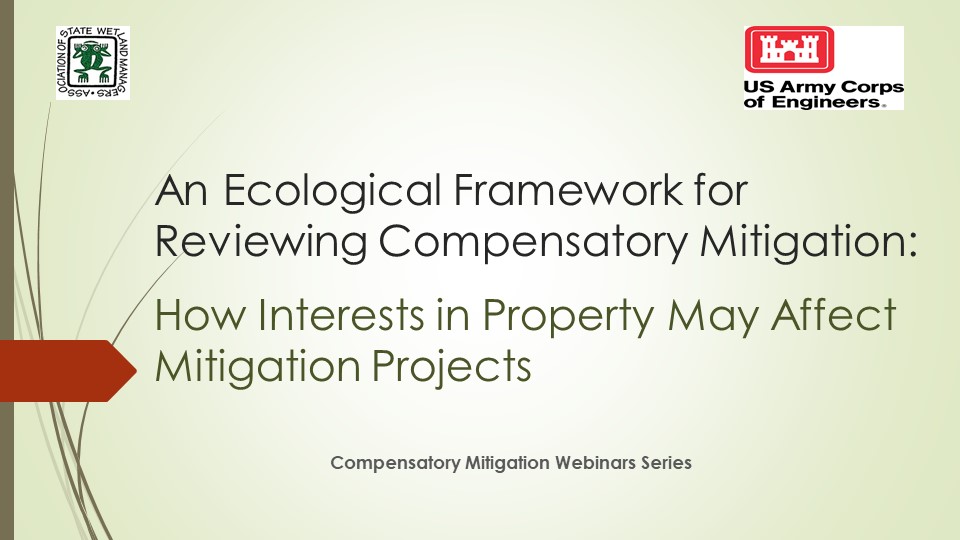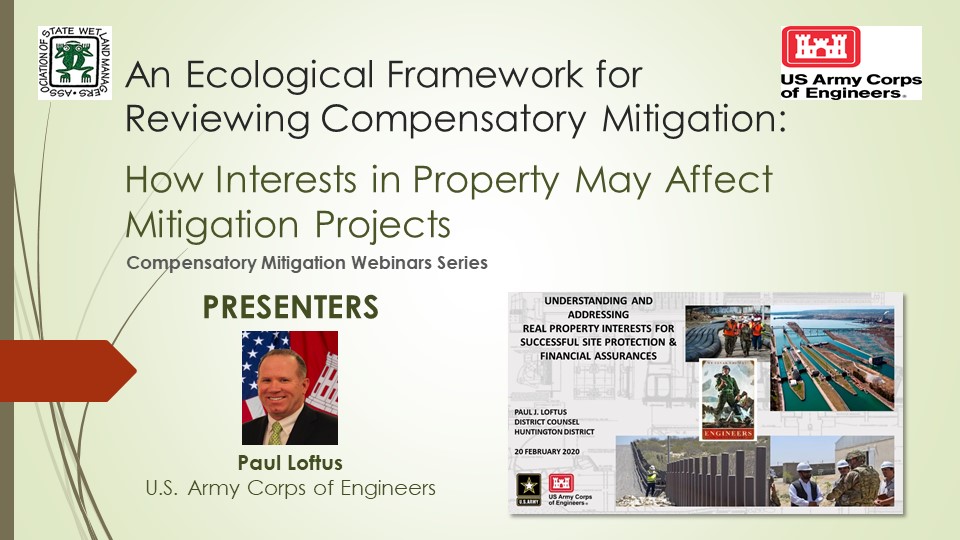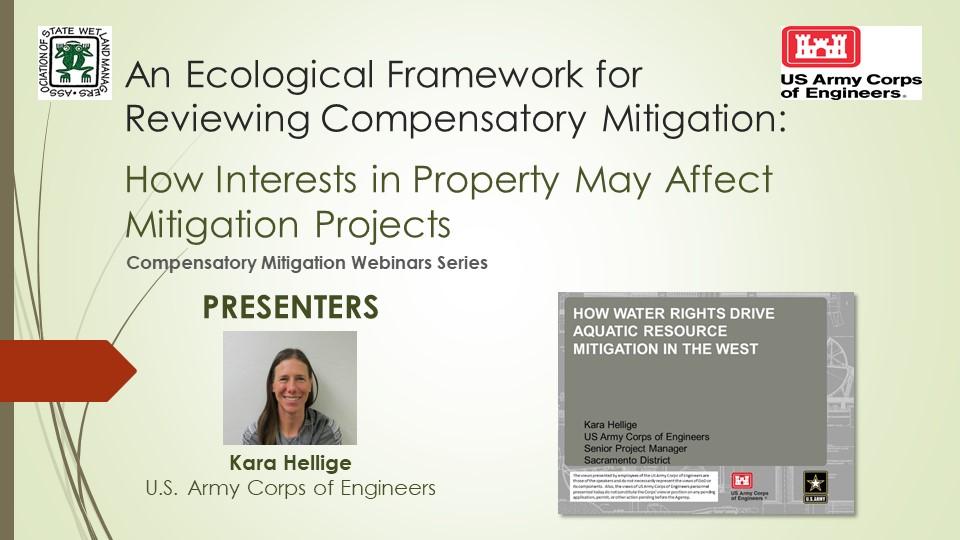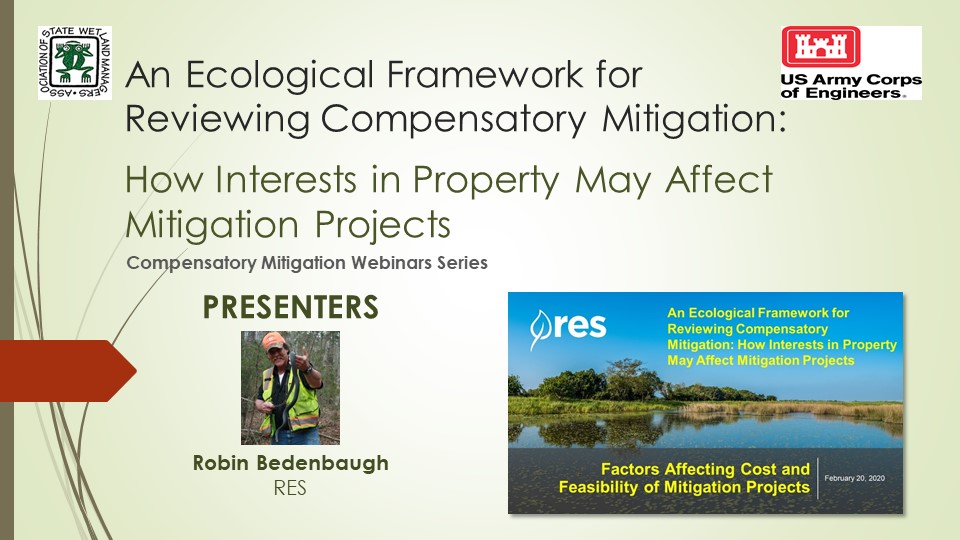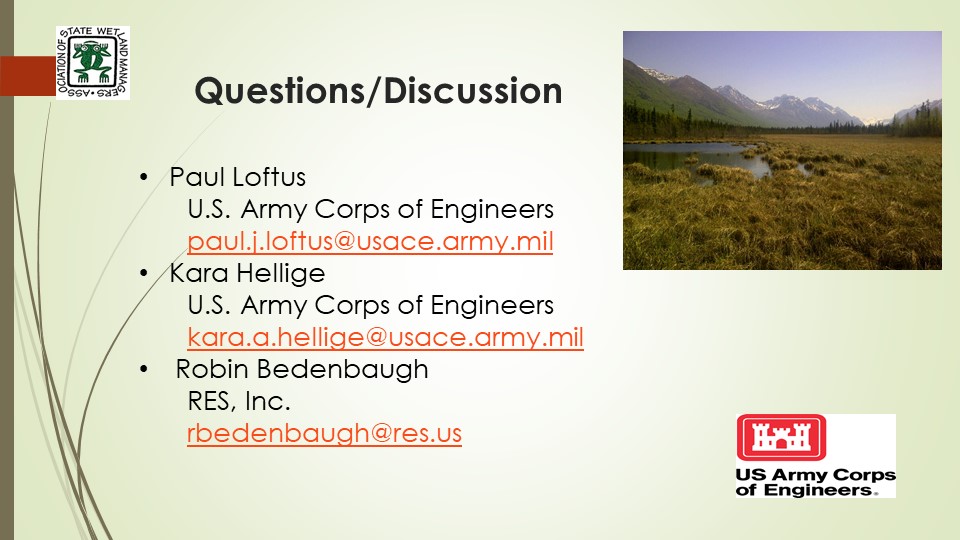Webinar 9: An Ecological Framework for Reviewing Compensatory Mitigation: How interests in property may affect mitigation projects
Held Thursday, February 20, 2020 - 2:00pm – 4:30pm Eastern
INTRODUCTION
- Marla Stelk, Executive Director, National Association of Wetland Managers [POWERPOINT PRESENTATION]
PRESENTERS
- Paul Loftus, U.S. Army Corps of Engineers [POWERPOINT PRESENTATION]
- Kara Hellige, U.S. Army Corps of Engineers [POWERPOINT PRESENTATION]
- Robin Bedenbaugh, RES [POWERPOINT PRESENTATION]
ABSTRACTS
Paul Loftus
Understanding and Addressing Real Property Interests for Successful Site Protection and Financial Assurances
Audience Level: Basic
To ensure that mitigation projects are provided long-term protection through real estate or other available mechanisms it is necessary to understand basic concepts of property law, including title concepts, encumbrances of property, priority of interests, and potentially severed interests or estates. The goal of this presentation was to understand real estate legal concepts within the framework of planning for successful site protection for mitigation sites, and to address issues arising from prior and severed interests in property pledged to protect mitigation projects.
Kara Hellige
How Water Rights Drive Aquatic Resource Mitigation in the West
Audience Level: Basic
Water is a finite resource in the arid west and as demands on water supply increase, implementing legal protection for the hydrology of aquatic resource mitigation is as essential for long term success as site selection and mitigation design. The goal of the presentation was to shed light on questions regarding self-sustaining aquatic resource mitigation and restoration projects, methods to protect aquatic resources from future water demands in perpetuity, and federal and state regulatory requirements. This discussion will provide examples of how water rights have governed mitigation success and failures within arid regions.
Robin Bedenbaugh
Factors Affecting Cost and Feasibility of Mitigation Projects
There are many property interests that can affect mitigation projects, with the most common affects being negative impacts to cost and schedule. Impacts to cost and schedule ultimately translate to challenges to the overall feasibility of the projects. This presentation lookrf at some of these property interests and how they can affect mitigation projects; and will also address the numerous other associated interests that can compound the effects on a project’s costs and overall feasibility. Examples will be provided of mitigation projects that were able to successfully overcome these challenges and another project that was unable to overcome the challenges.
BIOS
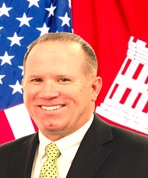 Paul Loftus is the District Counsel for the U.S. Army Corps of Engineers, Huntington District. Mr. Loftus serves as the Chief Legal advisor for the District with responsibility for all legal activities and functions of the District. Prior to joining the Corps of Engineers in 2016, Mr. Loftus was a litigation partner at Huddleston Bolen LLP and Dinsmore & Shohl LLP in Huntington, WV. In private practice Mr. Loftus represented transportation companies in litigation and was active in industry groups, including the Inland River Ports and Terminals Association, the American Short Line & Regional Railroad Association, and the National Association of Railroad Trial Counsel.
Paul Loftus is the District Counsel for the U.S. Army Corps of Engineers, Huntington District. Mr. Loftus serves as the Chief Legal advisor for the District with responsibility for all legal activities and functions of the District. Prior to joining the Corps of Engineers in 2016, Mr. Loftus was a litigation partner at Huddleston Bolen LLP and Dinsmore & Shohl LLP in Huntington, WV. In private practice Mr. Loftus represented transportation companies in litigation and was active in industry groups, including the Inland River Ports and Terminals Association, the American Short Line & Regional Railroad Association, and the National Association of Railroad Trial Counsel.
Mr. Loftus is a graduate of the University of Dallas (BA), The University of Maryland College Park, (MA), and the West Virginia University College of Law (JD). He is licensed to practice law in Kentucky, Maryland, and West Virginia and is admitted before various state and federal courts.
 Kara Hellige is the Senior Project Manager for the US Army Corps of Engineers, Durango Colorado Regulatory Office for the Sacramento District. She covers regulatory actions under Section 404 of the Clean Water Act and Section 10 of the Rivers and Harbors Act. Kara has been working for the Corps of Engineers within Regulatory since 1999 and has been in the Durango Office since 2003. She is currently the lead on several interagency review teams for mitigation banks and an in-lieu fee program, along with the review lead for countless permittee-responsible mitigation and voluntary restoration/creation projects.
Kara Hellige is the Senior Project Manager for the US Army Corps of Engineers, Durango Colorado Regulatory Office for the Sacramento District. She covers regulatory actions under Section 404 of the Clean Water Act and Section 10 of the Rivers and Harbors Act. Kara has been working for the Corps of Engineers within Regulatory since 1999 and has been in the Durango Office since 2003. She is currently the lead on several interagency review teams for mitigation banks and an in-lieu fee program, along with the review lead for countless permittee-responsible mitigation and voluntary restoration/creation projects.
 Robin Bedenbaugh is a wetland restoration ecologist and senior project manager with RES. He holds a BS and MS in Biology from Old Dominion University. He has worked as an environmental scientist in Virginia for over 38 years, with much of his career focused on wetlands delineation, permitting and mitigation for DOT and DOD clients. His areas of expertise include both tidal and non-tidal wetland restoration and he has designed and overseen the development of successful wetland mitigation projects in a number of states. His special area of interest is in non-tidal forested wetland mitigation, and he has devoted much of his professional career towards the advancement of design, construction, and monitoring of these systems.
Robin Bedenbaugh is a wetland restoration ecologist and senior project manager with RES. He holds a BS and MS in Biology from Old Dominion University. He has worked as an environmental scientist in Virginia for over 38 years, with much of his career focused on wetlands delineation, permitting and mitigation for DOT and DOD clients. His areas of expertise include both tidal and non-tidal wetland restoration and he has designed and overseen the development of successful wetland mitigation projects in a number of states. His special area of interest is in non-tidal forested wetland mitigation, and he has devoted much of his professional career towards the advancement of design, construction, and monitoring of these systems.
View Past Compensatory Mitigation Training Webinars Here
View a List of Past Compensatory Mitigation Training Webinar Recordings Here

